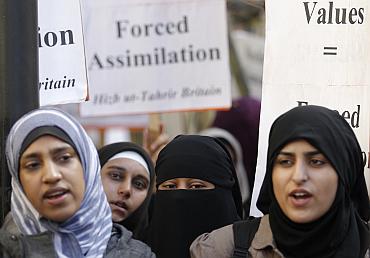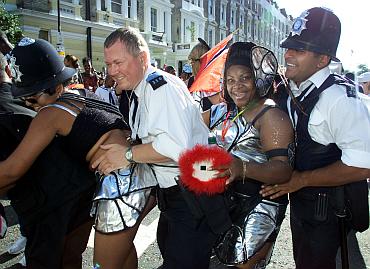Photographs: Luke MacGregor/Reuters Siddhu Warrier
For many right-wingers, the phrase 'the changing face of the UK' conjures up images of hordes of brown, black and yellow people, burqas, and general displays of un-Britishness (whatever that might be).
However, until recently, the mainstream generally disavowed this characterisation of the country and preferred to celebrate the concept of a modern, multicultural Britain.
The country I moved to in 2005 as a student was not a rainbow nation where people of each color stuck to their own. It was a veritable melting pot where, largely, people of different races intermingled quite comfortably. When I heard of friends in interracial relationships in the US being subject to uncomfortable stares, they appeared a world away. In fact, people of mixed ethnicity are the fastest growing group in the UK. There was recognition in the mainstream that the definition of what it meant to be British had changed, and Britain was all the richer for it.
However, a lot appears to have changed over the past few years.

In the 2005 general elections, the ruling Labor party had accused the Conservatives of being racist when they attacked immigrants in an (ultimately futile) attempt to swing Middle England's (predominantly white and conservative middle classes who typically live outside London) votes their way.
But starting around 2007, the same Labor party--faced with dropping poll ratings, increasingly hostile tabloid headlines, and a faltering economy--began to change its tune. It appeared unwilling to come to terms with the fact that the drop in its popularity was due in no small part to its attacks on civil liberties, and having followed United States President George W Bush into bloody conflicts in Asia. It preferred to ignore the failures of its slavish adherence to Thatcherism and globalization. It failed to acknowledge that the dismantling of the manufacturing sector, privatisation of even profitable public sector undertakings, persistent attacks on workers' rights, and over-reliance on the financial sector had been unmitigated disasters that resulted in an unequal society.Is this the end of the British welfare state
Image: Britain's Prince Charles and Camilla, Duchess of Cornwall (L), pour holy water over a Murti figure during their visit to the Shri Swaminarayan temple in northwest LondonPhotographs: Toby Melville/Reuters
The government then tightened entry rules for highly skilled non-European Union immigrants who had little to do with working class unemployment. Given that a large proportion of non-EU immigrants are from the Indian subcontinent, the government also hoped to assuage the fears of Middle England by reducing the number of non-white faces on the streets of Britain.
But since the 2010 general elections, with the rise to power of the hard-line, neo-Thatcherite coalition of the Conservatives and Liberal Democrats, this narrative seems set to undergo a far more wide-reaching change. The government is widely expected to use the recession caused by the rich in the City of London to embark upon an age of austerity that should see the last nails being driven into the coffin of the British welfare state.

Simultaneously, the new government is ratcheting up the anti-immigrant speak. It indulges in illiberal and largely pointless gesture politics when it talks of placing numerical limits on highly skilled migration, even though this makes up just 17 per cent of total net inward migration into the UK. It shouts loudly from the rooftops that immigrants need to 'integrate' better, the unsaid implication being that non-conformance with the Judeo-Christian pre-1948 ethic of Britain will be frowned upon.
The potential destruction of the welfare state and the public sector in the name of balancing the budget may well cause an increase in the numbers of the poor. Therefore, the concomitant rise in anti-immigrant rhetoric serves the government well in that it deflects attention away from the government's role, and towards the purported hand of the (non-white) foreigner.'Political parties need a scapegoat'
Image: Police officers dance with revellers at the Notting Hill carnivalPhotographs: Ferran Paredes/Reuters
When the British government in the 1980s destroyed the livelihoods of large parts of the British working class in the name of reining in inflation and restoring the economy's competitiveness while simultaneously warning of the dangers of being swamped by Asians, the results--as seen in the race riots in Chapeltown, Brixton, Liverpool, and the Midlands to name just a few--weren't very pleasant to behold.
The country I live in in 2010 still remains a melting pot. However, there is a palpable change in the atmosphere. The polemical headlines on Britain's right-wing tabloids, never renowned for their xenophilia, have grown evermore hostile towards immigrants, particularly those of Asian and African extraction. Almost every article on immigration features images of black and brown people, preferably those wearing burqas.

But what is more worrying than the tabloid headlines themselves is the alarming rapidity with which British political parties have given up any pretence to having any ideology beyond the appeasement of Middle England and its favorite tabloids. Additionally, all three political parties require a scapegoat to blame for the multiple failures of the neo-liberal economic principles they have championed for the past several years. And what better scapegoat can one wish for than non-white immigrants, who comprise a mere 8 percent of the population?
Is today's multicultural Britain likely to be burnt in the raging fires of an economy in crisis, presided over by a hard-line government that wishes to cover for its sins by whipping up a xenophobic frenzy? Will the Britain I saw in 2005--where I almost immediately felt at home--survive into 2015?



article